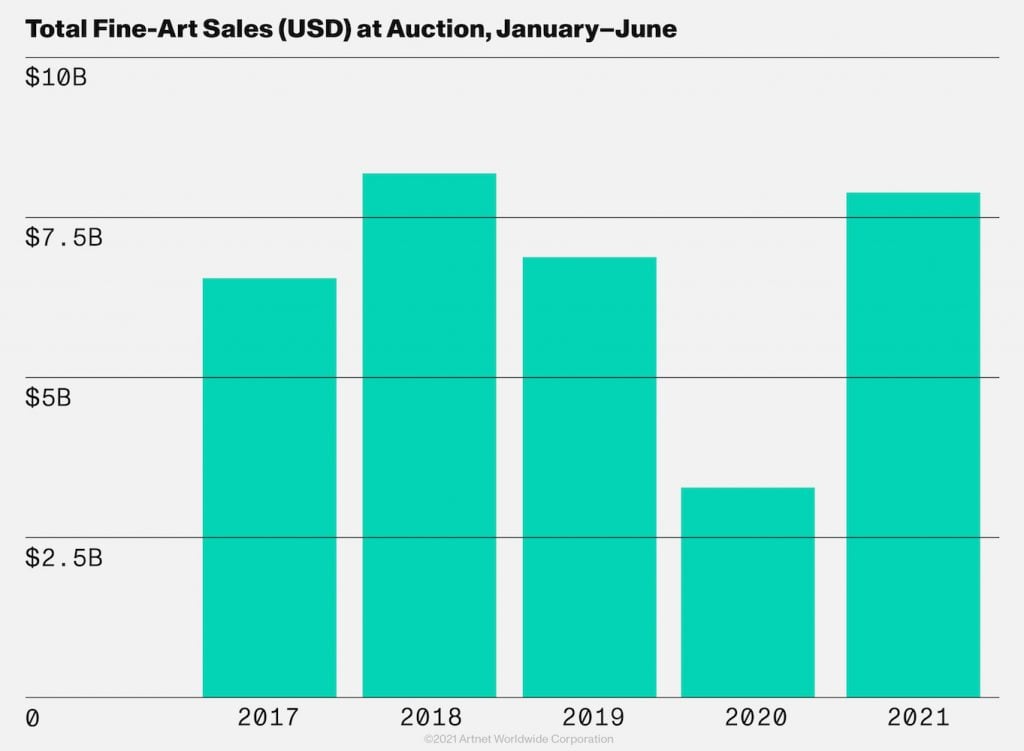The Intelligence Report
Introducing: The Artnet Intelligence Report, Fall 2021 Edition
The fall 2021 edition of the Artnet Intelligence Report tracks the market's rebound from lockdown—and looks toward the future.

The fall 2021 edition of the Artnet Intelligence Report tracks the market's rebound from lockdown—and looks toward the future.

Artnet News

When we conceived the theme for this issue—the Roaring 2020s—we were in the middle of that brief, innocent window of time in early summer when vaccinations were spreading swiftly, restaurants were filling up, and people felt comfortable saying phrases like “post-COVID.”
As you read these words, things out there undoubtedly look a bit different. The Delta variant is infecting the unvaccinated with unprecedented speed, masks are firmly back on, and many of us have returned to a state of uncertainty that leaves us thinking, “Is that really a good idea?”
At a moment when seemingly everything, from this virus to the weather, is unpredictable, it’s strange to imagine what the rest of the decade will look like. But doing so feels like a worthwhile exercise in optimism.
In this issue, you’ll find a quartet of profiles of collectors who embody the future of the discipline. From Korean pop star T.O.P., who has unwittingly introduced thousands of teens to the likes of Mark Grotjahn and Gerhard Richter, to Nish McCree, who is applying her expertise in global development to boost the profiles of African female artists, these passionate art lovers are looking to shift the axes of power in the art world.
Tim Schneider will introduce you to five technologies that will change the way the art market does business by 2030. Some, like augmented reality, you may already be familiar with; others, like the concept of digital self-determination, I bet you $100 you aren’t.
Our data-led breakdown of the market also reveals which cities are the fastest-growing auction hubs, and just how much money NFT sales actually made for auction houses.
Elsewhere, Darla Migan offers a glimpse of what the art market looked like in the original Roaring ’20s, and Nate Freeman spotlights five galleries where you’ll definitely want to party the next time the world feels, fleetingly or not, like it might be returning to some kind of normal.
This issue of the Artnet Intelligence Report is the first that will be available in full exclusively to Artnet News Pro members. (All our previous issues will remain freely accessible here.)
From the beginning, we designed this magazine to be a valuable tool for those in the trade—offering exclusive insight into buyers and sellers of the season’s biggest lots and trends on the horizon—as well as a resource for aspiring collectors who want to look beyond the headlines to understand exactly what makes the market tick.
This issue represents the work of many talented people you don’t see listed in the table of contents. Illustrator Klara Graah, for example, expertly envisioned the art world of the future (check out her hologram Larry Gagosian on page 57). Meanwhile, the crack Artnet Business Intelligence team, Robert Cacharani and Michaela Ben Yehuda, aggregated so much auction sales data that the master spreadsheet takes a full 15 seconds to load.
You can read the biggest takeaways from the report for free below, and in the coming weeks we’ll be offering readers a couple sneak peeks of the many stories in this issue. But the only way to get the full product is to subscribe. We hope you’ll agree that this kind of coverage is worth investing in.
– Marketplace
• Why the pandemic made the art market stronger
• What fashion designer and collector Christian Siriano buys (and why)
• The top 10 lots of 2021 (so far) in every major category
– Step Aside, Hedge-Funders. The Art Market Has New Power Players Now
by Katya Kazakina, Rebecca Anne Proctor, Vivienne Chow, and Melissa Smith
From a Korean pop star to an orthodontist in Atlanta, a new class of visionary collectors wants to change how power is distributed in the art world.
– Galleries Who Party Together Stay Together
by Nate Freeman
Hungry for social contact? These five galleries, headquartered in major art hubs around the globe, have become suns around which hip social circles orbit.
– What Happened in the Art Market During the Real Roaring ’20s?
by Darla Migan
This isn’t the first time the art market has been awash in new money as it emerges from a once-in-a-century pandemic. Here’s what happened last time.
– The Art World’s Technological Revolution Is Coming
by Tim Schneider
A cache of purported forgeries may have scammed everyone from top dealers to the prince of Liechtenstein. Now, the alleged mastermind of the fraud is speaking out.
– Here’s What’s Really Going on in the Art Market Right Now
by Julia Halperin
• How much are online sales actually growing?
• Which auction house has taken the lead in 2021?
• Who are today’s most bankable artists?
– Asia Rising
by Artnet News and Morgan Stanley
Asia’s art market has come through the pandemic stronger than ever. Here’s how that happened—and what it could mean for the future.

© Artnet Price Database and Artnet Analytics 2021.